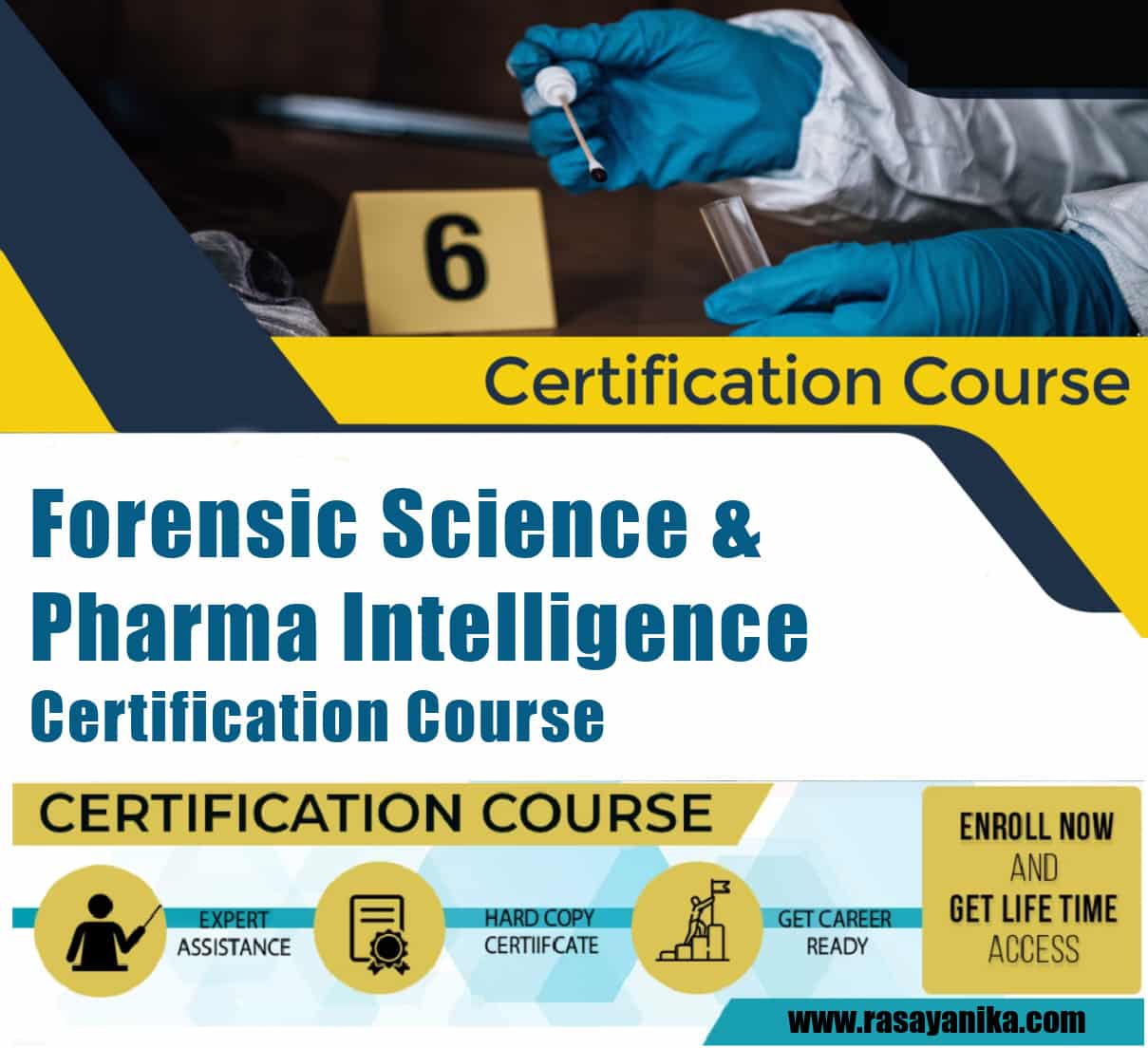Career in Forensic Chemistry
Forensic chemists use completely unrelated things like mystical white powder, blood smear, and left-out foods, etc to analyze a crime scene and solve it. They find clues from things which we think as useless. However, they could be meaningful for forensic drug stores, that evaluate physical proof as well as samples for clues to fix crimes.
Forensic Science has many specializations including Forensic Chemistry, Forensic Biology, Forensic Toxicology, Forensic Serology, Forensic Entomology, Forensic Ballistics, and Forensic Botany.
If you have a strong desire to work in forensics, then a career in forensic chemistry is one of the best choices.
Forensic Chemistry can be described as the practice of application of our knowledge in the field of chemistry to solve crimes.
There are a number of methods that we can take on from chemistry to aid solve unpredictabilities in a crime scene. If you are looking for a job that involves chemistry, life science, and criminal investigations forensic chemistry is a suitable career.
Forensic chemistry entails using clinical approaches to investigate physical evidence. Forensic chemists examine evidence gathered from crime scenes and provide conclusive testimonies based on lab results. The analyses of the accumulated proof help law enforcement
figure out the source of the crime or who is the criminal. Samples of examined evidence consist of DNA samples from materials such as hair and blood and rubble gathered from a crime scene such as soil, paint chips, and glass pieces, etc.A forensic chemist must have an understanding of the various fields, including biology, genetics, physics, toxicology, and also materials science.
Forensic chemists analyze non-biological trace evidence present at crime scenes in order to identify unknown materials and match samples to known substances. They also evaluate drugs/controlled substances extracted from scenes and people in order to identify and sometimes quantify these materials.
Must-Know Techniques in Forensic Chemistry
Knowledge of the below-mentioned techniques can be useful to have a successful career in forensic chemistry.
- Spectroscopy techniques are used to check the purity of materials.
- Using identification and separation techniques for detecting illegal drugs and narcotics.
- Different Chromatography techniques are used to identify trace amounts of drugs and poisons in the body.
- Scanning Electron Microscopy, Neutron Activation Analysis, and Energy Dispersive Spectrometry to identify and gunshot residues and the post-explosion debris.
- Laser ablation inductively coupled plasma mass spectrometry is used to examine the structure of glass on an atomic level.
- Carbon-14 dating uses the levels of carbon-14 present in a sample to determine the age of fossils and other substances.
- Drug testing is conducted to determine if there are drugs present in an otherwise unknown substance.
Forensic Science & Pharma Intelligence Certification Course – Registrations Open
Educational Requirement For A Career In Forensic Chemistry
A strong background in chemistry and instrumental evaluation is required to get a successful career in this field. A bachelor’s degree in forensic science or life sciences is needed for working in crime labs.
- First, candidates have to complete their 10+2 examination from the science branch for admission into a bachelor’s degree in forensic chemistry.
- Then you can pursue post-graduation programs in Forensic Chemistry, later on, you can also proceed with research in this field.
- A Ph.D. is often preferred for higher positions.
- You can also pursue an under-graduation in chemistry, and then pursue post-graduation in forensic chemistry.
Technical Skills Required
- A strong background in chemistry.
- Excellent grounding in criminalistics.
- Extensive coursework in maths, chemistry, as well as biology.
- Exceptional experimental technique.
- Strong background in the instrumentation and quantitative/qualitative evaluation.
- Being detail-oriented.
- Critical thinking skills.
- Problem-solving skills.
- Excellent oral communication skills.
- Writing skills.
- Knowledge of various fields of science.
- Technical Skills.
- Strong Analytical Skills
- Keen Observing Skills.
Workspace
Some forensic chemists work in law enforcement crime laboratories and are required to confer their conclusions at legal proceedings. Some work in the actual crime scene to collect the samples or evidence. Some work in the lab to run tests on samples colled.
Role of a Forensic Chemist
- Conduct chemical analyses on evidence collected from crime scenes.
- Determine possible misconduct in criminal cases by analyzing evidence.
- Conferring with other professionals ls in associated disciplines like law enforcement, medical examination, and toxicology.
- Composing lab reports compiling the outcomes of evidence analysis.
- Reconstructing the physical perspectives of a crime scene using models, drawings, or 3D imaging technology.
- Attesting to the legality of criminal data in legal procedures.
Universities/institutions offering a degree in forensic chemistry
- Institute of Forensic Sciences, Mumbai (IFSC)
- Amity University – Amity Institute of Forensic Sciences, Noida (Delhi NCR)
- Bundelkhand University, Jhansi, (UP)
- Dr. Bhim Rao Ambedkar University, Agra (Agra University) – (UP)
- Dr. Hari Singh Gour University, Sagar (M.P.)
- Galgotias University, Noida
- Gujarat Forensic Sciences University
- IFS Education Department (IFS Pune)
- Osmania University, Hyderabad,
- Panjab University, Chandigarh
- Sam Higginbottom Institute of Agriculture, Technology & Sciences (SHIATS), Allahabad (UP)
Job profiles One Can Apply For in Forensic Chemistry Field.
- Crime Scene Investigator
- Investigative officers
- Forensic Expert
- Forensic Scientist
- Legal counselors
- Law Consultant
- Handwriting Expert
- Crime Reporter
- Teacher/Professor
Employers of forensic chemists
- Directorate of Forensic Science Services
- Intelligence Bureau (IB)
- Central Bureau of Investigation (CBI)
- Defense/Army
- Central Govt. Forensic Sciences Labs
- Universities
- Private Detective Agencies
- Hospitals
- Banks
- Police Department
- Quality Control Bureau
- Law Firms
Forensic Science & Pharma Intelligence Certification Course – Registrations Open
Salary
Most of the jobs of forensic science are in the government sector due to which the income is strictly based upon the structure and pay scale. In the Private sector, companies provide high salaries to experienced candidates.
- The initial salary will be around Rs. 3-4 Lakhs per annum.
- Experienced candidates earn a salary of around Rs 6-8 Lakhs per year.
- In foreign countries, the average salary will be around $55,040 per year.
This field of science is guardedly confident regarding career prospects. The scope of forensic science study is substantial. There are unlimited opportunities in this discipline due to the increasing crime rate. You can get a job in India or abroad.
Career in Forensic Chemistry

















































I wants to do msc in chemistry and after it I will do forensic chemist that is right way or not